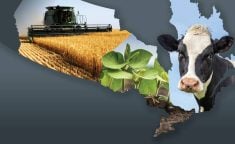A law intending to offer financial relief from carbon pricing for farmers drying grain was the focus of a recent parliamentary committee.
On March 9, MPs sitting on the Standing Committee on Agriculture and Agri-Food had a chance to question the bill’s creator, Conservative MP Philip Lawrence.
The proposed law reached committee after receiving support from each party outside of the governing Liberals.
If passed, Bill C-206, an act to amend the Greenhouse Gas Pollution Pricing Act (qualifying farming fuel) would exempt qualifying farming fuels to include natural gas and propane from carbon pricing.
Read Also

Mazergroup’s Bob Mazer dies
Mazergroup’s Bob Mazer, who helped grow his family’s company into a string of farm equipment dealerships and the main dealer for New Holland machinery in Saskatchewan and Manitoba, died July 6 from cancer.
Lawrence told MPs that “nearly every farmer” he had spoken to supported the bill’s passage. That sentiment rings true when reviewing the long list of producer groups supporting it.
Propane and natural gas are used to dry grain. A wet 2019 harvest resulted in producers complaining they had no option but to pay the carbon costs that come with grain drying.
This results in farmers paying for an “inequitable share of the carbon tax,” according to Lawrence.
“Farmers quite often don’t have other options,” he said, adding shortly after that “rural Canada needs more support, not more taxes.”
The federal carbon pricing backstop plan applies to businesses and residents in Alberta, Saskatchewan, Manitoba and Ontario. A study from the Canadian Federation of Independent Businesses (CFIB) found farmers paid an average of $14,000 in carbon fees during the first year they applied, in 2019.
Opposition parties and grower groups have been lobbying Minister of Agriculture and Agri-Food Marie-Claude Bibeau to offer a more favourable exemption since 2019, but the Liberals have not done so.
Bibeau had previously said carbon costs for grain drying were not having a “significant impact” on farmers’ bottom lines.
An evaluation of grain-drying costs provided by some provincial governments or producer groups was done in 2019 by Agriculture Canada. The results don’t represent the department’s estimates, and instead represent a standard set of results from different groups to offer comparable results.
That report found, “based on the information received, the average per-farm cost of pollution pricing associated with grain drying by province ranges from 0.05 per cent to 0.38 per cent of net operating costs for an average farm, equivalent to $210 to $774, depending on the province in question.”
Hours prior to Lawrence’s bill gaining support from opposition members and moving closer to becoming law, Bibeau announced the Liberals were now “committed to new rebates for on-farm fuel use such as grain drying, in order to both support our food producers and also encourage new investments in sustainable technologies, that go beyond existing exemptions for farm fuels and rebates for greenhouses.”
The Liberals contend Lawrence’s bill “does not provide relief for the fuel costs of grain drying, as it does not add grain drying as an eligible farming activity” as the reason for not simply supporting his bill to offer farmers relief.
Parliamentary experts assisted Lawrence in drafting the text of the bill, who argues his bill would meet its intended purpose.
“The definition of farming is not exhaustive and it currently doesn’t include the planting of crops, so if we wanted to go by an exhaustive list, there would be nothing covered and clearly that is not the case,” he told committee members.
More than once, he insisted on wanting to strike a “tone of collaboration” and expressed a willingness to expand the scope of his bill, particularly to include fuels used for barn heating as an eligible exemption.
“(The bill) does apply to grain drying. It does not apply to barn heating, but we’re open to an exemption on that,” he said, noting nobody brought up a concern his bill wouldn’t extend to grain drying until Bibeau did so.
Like most MPs drafting legislation, Lawrence worked closely with parliamentary employees who have expertise in drafting legislation to ensure grain drying would be included.
“I can’t see a reasonable person disagreeing on that,” he said.
Liberal MP Francis Drouin said there may still be confusion over definitions in the proposed legislation that could result in future headaches for lawmakers, noting the “conundrum that it can create.”
Lawrence joked that nobody was going to “go tanning in a grain dryer” and its purpose was clearly a farming activity, but told Drouin that if expanding the scope of the legislation is needed to get it passed, he would be open to it.
“If that is the difference between this bill passing or not, let’s do it,” he said.
Bibeau appeared before the same committee days after Lawrence did so. Bibeau offered a lengthy response when asked why her government would now look to implement a rebate if the position was grain-drying costs are insignificant.
“When we have done all the calculations, provided by industry and the provinces, it was strictly based on the price of pollution applied to grain drying,” she said. “We have announced a significant increase on the price on pollution and we acknowledge that all the technology for our farmers to get better equipped in terms of energy-efficient equipment is not readily available, so this is why we have committed to new rebates for on-farm fuel use,” she said.
Lawrence isn’t expected to return to the committee again for several weeks. It is possible the committee brings an amendment to address the Liberals’ concern with the legislation, or extend it to barn heating, before it moves on to the next stages of becoming law.




















